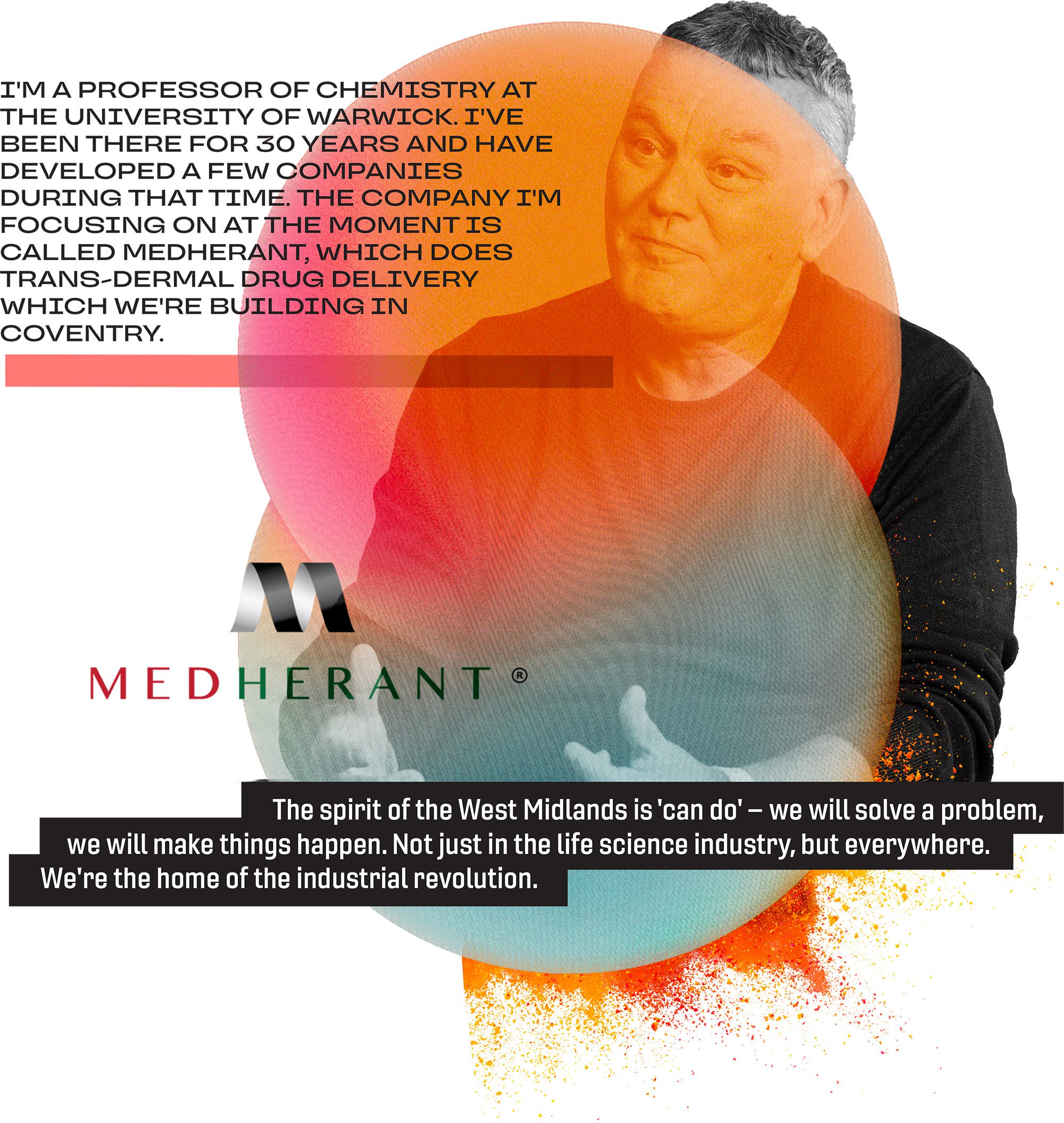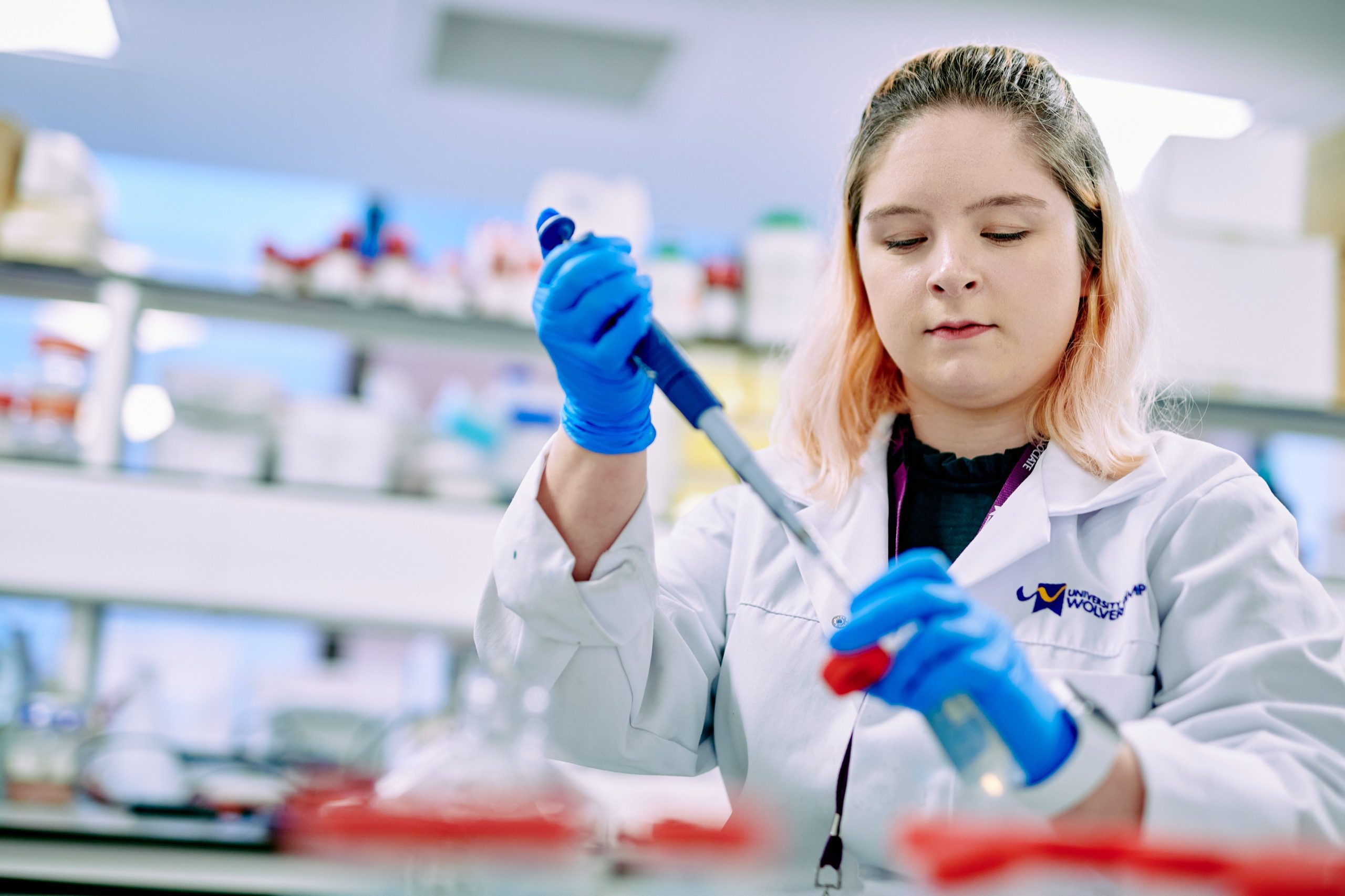Medherant Sticks to Success
Medherant Case Study

With 35 research facilities clustered around eight world-class academic institutions and a healthcare system serving over four million people, it’s easy to see why life sciences is a growing sector within the West Midlands. David Haddleton, professor of chemistry and founder of life science company, Medherant, says the region enjoys a fluid connection between academia and industry.
I’ve worked at the University of Warwick for over 30 years now and I’ve spun out several businesses as a result of my research. Medherant is based at the University of Warwick Science Park in Coventry, and it’s only a five minute walk from my university offices. There’s great cross-pollination of ideas between the research lab and industry – it’s all about keeping your eyes open to opportunity.
Professor Haddleton is a polymer chemist. ‘You might think of a polymer as something used in paint or plastics, but polymers are everywhere. They’re particularly prevalent in life sciences and drug delivery. At Medherant we’ve developed a polymer-based adhesive which can be infused with a drug, transformed into a patch, and used for transdermal drug delivery – like a nicotine or ibuprofen patch. Transdermal drug delivery is a really effective way of getting drugs into a patient’s system without using needles, or having to take pills that might affect the stomach. Medherant is developing a testosterone hormone replacement therapy patch for women. Following the menopause, a woman’s body produces less testosterone and, even though it’s a useful hormone, there’s currently no testosterone product approved for women who want to top up their testosterone levels post-menopause. That’s the gap we’re hoping to fill.’
Medherant currently employs between 15-20 people including about 12 skilled chemists and scientists, most with PhDs. ‘This is the fluidity I mentioned before,’ Haddleton explains. ‘Medherant is right next door to the world’s leading centre of polymer research at the University of Warwick, which means we’re talent-rich. There are lots of universities in the West Midlands filled with bright, inquisitive minds, and that makes it an exciting place to start a business.’
Haddleton recognises that, in the life sciences sector, innovation lies in the domain of smaller companies. ‘The big pharmaceutical companies – GSK, Pfizer, AstraZeneca – are almost too big to adapt quickly to new areas of research. Innovation is the business of smaller companies. Once a product is viable, the big companies might offer to buy them out.’
But having the idea and understanding the science is only the start of the journey towards commercialisation. Haddleton confirms, ‘Patenting the intellectual property is a critical stage in the process. In the West Midlands there are organisations who can help you; we’ve worked with Withers and Rogers based in Leamington Spa. And when you’ve established that your idea is viable, you’ll need funding. The UK has some pretty good tax incentives to encourage individuals to invest in start-ups and one of the country’s biggest venture capital trust (VCT), Mercia, is actually based in Henley-in-Arden in Warwickshire. They’ve been a great supporter of Medherant as well as my previous polymer therapeutic company.
Medherant also benefits from access to the University of Warwick’s state-of-the-art polymer characterisation facilities, and the way the region is leveraging inter-university relationships.
‘Our real challenge revolves around manufacturing. There isn’t a single production plant in the whole of the UK capable of manufacturing transdermal patches, so we have to go to Dijon in France to get them made. That’s something we hope to change in the future as we don’t want to be dependent on external supply chains. Eventually, it would be great to have a compact factory producing transdermal patches, not just for Medherant products but for other drugs companies. I’d love to see the region invest in this kind of facility, where a cluster of businesses could all share the infrastructure.’
Haddleton believes that innovation is part of the lifeblood of the region. ‘I’m a Birmingham lad originally, from Longbridge. With my career I could’ve worked all over the world, but the West Midlands is such a vibrant, diverse place to be, I came back 30 years ago after working in the US and Canada and haven’t left since. The life sciences sector is growing rapidly, and the speed of growth will accelerate as more businesses pop up and attract more expertise. We’ve got great infrastructure for product development, testing, we’ve got the scientists and the medical knowledge. And it’s so well-connected, people want to come and work here.’
Haddleton’s ambitions for Medherant are impressive. ‘We have technology that will allow the transdermal delivery of a whole range of drugs, not just hormone replacement therapy. In the short term we want to get through our clinical trials and get this unique product for women to market, because it’s so desperately needed. From there we want to springboard into the rest of Europe, then the US. As part of this growth, we hope to create a manufacturing facility for the production of transdermal patches right here in the West Midlands, and we could use this in the manufacture of other products to help treat other diseases such as dementia and alzheimer’s. These drugs are at a slightly earlier stage of development, but our transdermal patch technology would be a great mode of delivery for people who might not always remember to take their medication orally.’
With over 50% of all chemists working in the field of polymer analysis and development globally, this is clearly a potential growth area for the life sciences industry.
‘One thing I would say to young academics,’ Professor Haddleton adds,
is to keep interacting with the outside world. Innovation and research are great, but always think about how and why your research will be useful. Think about how you can contribute to society, and what problem you’re going to solve. Once you’ve got that worked out, don’t forget to protect your intellectual property! With our people, infrastructure, and our heritage as the birthplace of the industrial revolution, there is no place like the West Midlands for seeing innovation blossom into life-changing products.
DIVE IN TO ANOTHER STORY:

Rebel Without a Carbon Footprint
It Starts Here

Riding the Wave of Disruptive Tech
It Starts Here




